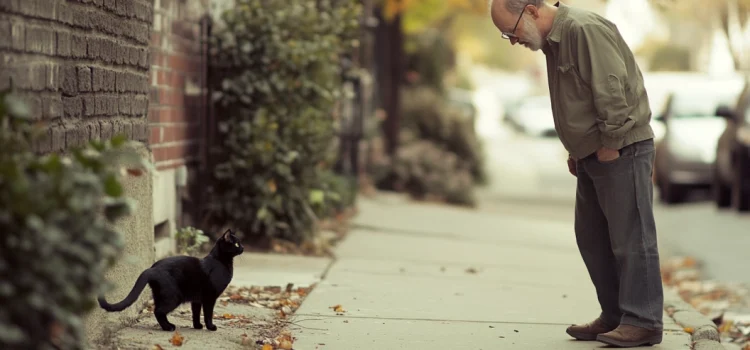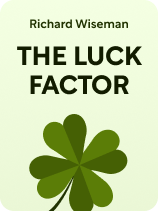

This article is an excerpt from the Shortform book guide to "The Luck Factor" by Richard Wiseman. Shortform has the world's best summaries and analyses of books you should be reading.
Like this article? Sign up for a free trial here.
Does bad luck seem to follow you? Do you want to know how to avoid bad luck?
Many people revert to superstitions to prevent bad luck, such as avoiding black cats, not opening umbrellas indoors, and so on. But psychologist Richard Wiseman says that avoiding bad luck can be as simple as changing how you view it.
Here’s Wiseman’s take on bad luck from The Luck Factor.
Turn Your Luck Around
Want to know how to avoid bad luck? The truth is that the only way to turn your luck around is to not think of “bad luck” as bad luck at all. When things are going bad, “look on the bright side” might be the last thing you want to hear, but Wiseman insists that’s what lucky people do. To more easily adopt a positive perspective, he suggests you take time to picture different ways your supposed bad luck might have saved you from something worse. For instance, you might imagine that your last flat tire saved you from being in a traffic accident a few minutes later due to a drunk driver. You should also imagine how bad luck in the past may have led to a positive chain of events. For example, bad luck during one job interview might open the door to a different, better position later.
(Shortform note: The type of thinking Wiseman describes is also something we’re used to doing in reverse—often to negative effect. In The Paradox of Choice, Barry Schwartz explains that we can easily trigger feelings of regret if we think about current or past situations in terms of how they could have gone better. A 2017 study confirms this idea by showing a correlation between this type of rumination and instances of depression. Though reframing negative incidents in a positive light as Wiseman recommends may indeed be beneficial, many psychologists recommend that you avoid ruminating on the past altogether in favor of living in the moment.)
Likewise, Wiseman agrees that you shouldn’t dwell on your prior bad fortune. Instead, if you find yourself ruminating on the past, distract yourself with activities like exercise, watching funny movies, listening to music, and spending time with friends. If you can’t avoid thinking about the past, you should reminisce about positive events, reminding yourself of the good luck you’ve had to counter any recent bad luck you may be feeling. These activities shift your focus away from negative experiences, painting a more balanced portrait of your life—one in which your so-called “bad luck” doesn’t loom as large as it may at first seem.
(Shortform note: When shifting away from the past, keep in mind that your memory isn’t a perfect record. In Thinking, Fast and Slow, Daniel Kahneman explains that your memories of past events are colored by two factors—the peak intensity of the experience and how you felt when it ended. Therefore, your negative memories of a past vacation may be heightened by one bad experience. In the same vein, any positive memories you form about new activities you engage in today—such as kayaking down a nearby river—will largely reflect the most intense part of the trip. In short, when you follow Wiseman’s advice to look away from bad luck by creating good experiences, you only need a few, not an endless stream of positivity.)
Rule Your Luck—Don’t Let It Rule You
While Wiseman shows that belief in good luck is overwhelmingly positive, belief in bad luck is destructive because it makes you feel helpless to control your circumstances. Therefore, his final recommendation is to take charge of your life when bad luck strikes. Whatever misfortunes arise because of “luck,” you should immediately brainstorm solutions, decide on a course of action to take, and implement your solution right away. Instead of blaming external factors, focus on what you can learn and do differently whenever bad luck swings your way. If you can change and grow in some way as part of dealing with your misfortune, then perhaps your luck wasn’t as bad as you believed.
(Shortform note: Tying back to our discussion of aspirational goals, the way to follow Wiseman’s advice is clearer if you have an overarching purpose for your life. In The Laws of Human Nature, Robert Greene expresses this in terms of finding your purpose and using it to guide your actions. Greene writes that any purpose will do—as long as it’s internal and personal, you’ll be energized by your inherent talents and character. Once you find your purpose, you’ll know how to act when confronted with good or bad luck. Also, when following your purpose, you’ll find that some negative emotions, such as self-doubt and anxiety, are replaced by more productive emotions, such as passion and persistence.)

———End of Preview———
Like what you just read? Read the rest of the world's best book summary and analysis of Richard Wiseman's "The Luck Factor" at Shortform.
Here's what you'll find in our full The Luck Factor summary:
- The unconscious methods lucky people use
- The benefits of trusting your intuitive hunches
- The scientific explanation as to whether or not luck is real






